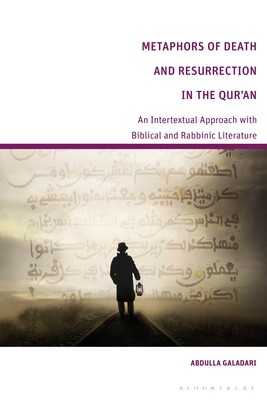
- We will send in 10–14 business days.
- Author: Abdulla Galadari
- Publisher: Bloomsbury Academic
- ISBN-10: 1350244562
- ISBN-13: 9781350244566
- Format: 15.6 x 23.4 x 1.5 cm, softcover
- Language: English
- SAVE -10% with code: EXTRA
Metaphors of Death and Resurrection in the Qur'an (e-book) (used book) | bookbook.eu
Reviews
Description
Through extensive textual analysis, this open access book reveals how various passages of the Qur'an define death and resurrection spiritually or metaphorically.
While the Day of Resurrection is a major theme of the Qur'an, resurrection has largely been interpreted as physical, which is defined as bones leaving their graves. However, this book shows that the Qur'an sometimes alludes to death and resurrection in a metaphoric manner - for example, rebuilding a desolate town, typically identified as Jerusalem, and bringing the Israelite exiles back; thus, suggesting awareness and engagement with Jewish liturgy. Many times, the Qur'an even speaks of non-believers as spiritually dead, those who live in this world, but are otherwise zombies. The author presents an innovative theory of interpretation, contextualizing the Qur'an within Late Antiquity and traces the Qur'anic passages back to their Biblical, extra-biblical and rabbinic subtexts and traditions. The eBook editions of this book are available open access under a CC BY-NC-ND 4.0 licence on bloomsburycollections.com.EXTRA 10 % discount with code: EXTRA
The promotion ends in 21d.00:40:37
The discount code is valid when purchasing from 10 €. Discounts do not stack.
- Author: Abdulla Galadari
- Publisher: Bloomsbury Academic
- ISBN-10: 1350244562
- ISBN-13: 9781350244566
- Format: 15.6 x 23.4 x 1.5 cm, softcover
- Language: English English
Through extensive textual analysis, this open access book reveals how various passages of the Qur'an define death and resurrection spiritually or metaphorically.
While the Day of Resurrection is a major theme of the Qur'an, resurrection has largely been interpreted as physical, which is defined as bones leaving their graves. However, this book shows that the Qur'an sometimes alludes to death and resurrection in a metaphoric manner - for example, rebuilding a desolate town, typically identified as Jerusalem, and bringing the Israelite exiles back; thus, suggesting awareness and engagement with Jewish liturgy. Many times, the Qur'an even speaks of non-believers as spiritually dead, those who live in this world, but are otherwise zombies. The author presents an innovative theory of interpretation, contextualizing the Qur'an within Late Antiquity and traces the Qur'anic passages back to their Biblical, extra-biblical and rabbinic subtexts and traditions. The eBook editions of this book are available open access under a CC BY-NC-ND 4.0 licence on bloomsburycollections.com.

Reviews